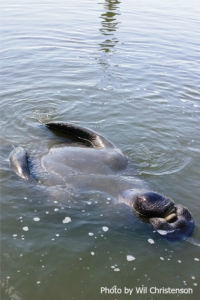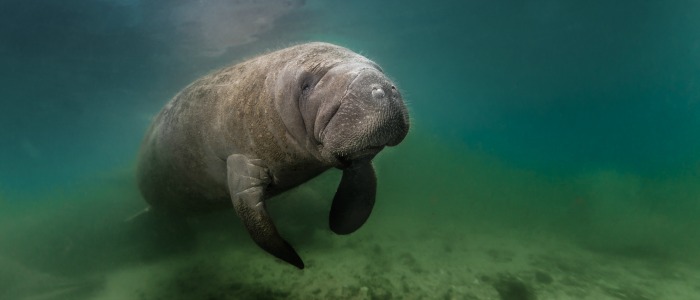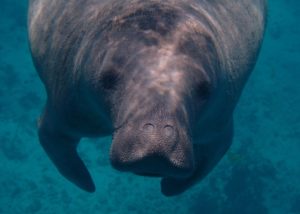
It’s that time of the year again when some friendly faces grace the waterways around the Lowcountry – that’s right, the West Indian manatees are back!
You might recognize manatees by their robust, gray bodies and their rounded, flat tail. Oftentimes the only thing you may see peeking up from the water is their nose and nostrils coming up to the surface to scope out what’s above. Despite earning the nickname “sea cow” due to their slow-moving behavior and relaxed demeanor, manatees are actually more closely related to elephants.
Though it’s exciting to see the latest tourists in Charleston, manatees face many threats by frequenting Lowcountry waterways. Manatees move pretty slow for a marine animal, only swimming about five miles an hour on average. They also only have six vertebrae in their neck, meaning they cannot turn their head side to side, but have to maneuver their entire bodies to look around. Because of these traits, manatees are prone to boat strikes, especially in waterways as busy as ours.
And, because of their irresistibly charming faces, it’s so tempting to throw these gentle giants a bit of lettuce or give them water from a hose. However, manatees are federally protected by the Marine Mammal Protection Act, just as dolphins and whales are. That means that it is illegal to be within 50 yards of them in a watercraft. Human interaction can lead to manatees lowering their guard around us, thus changing their behavior around boats and possibly facing fatal injuries in the process.
“Give manatees space and travel slowly when present. It’s illegal under the Marine Mammal Protection Act to touch, feed or give water, or to encourage animals towards your vessel,” says Lauren Rust, executive director of the Lowcountry Marine Mammal Network.
One great way to safely view local wildlife is by participating in a guided kayak or paddleboard tour with Coastal Expeditions. They offer a variety of outings and excursions throughout our region that can connect you to the wildlife and wild places around us – and, if you’re lucky, you may spot a manatee or two!



